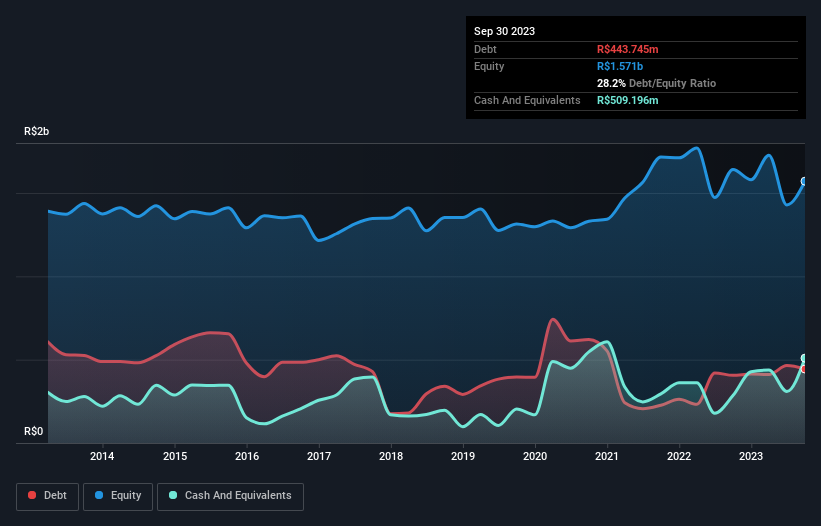Warren Buffett famously said, 'Volatility is far from synonymous with risk.' When we think about how risky a company is, we always like to look at its use of debt, since debt overload can lead to ruin. As with many other companies MAHLE Metal Leve S.A. (BVMF:LEVE3) makes use of debt. But should shareholders be worried about its use of debt?
When Is Debt A Problem?
Debt and other liabilities become risky for a business when it cannot easily fulfill those obligations, either with free cash flow or by raising capital at an attractive price. In the worst case scenario, a company can go bankrupt if it cannot pay its creditors. However, a more usual (but still expensive) situation is where a company must dilute shareholders at a cheap share price simply to get debt under control. Of course, the upside of debt is that it often represents cheap capital, especially when it replaces dilution in a company with the ability to reinvest at high rates of return. The first step when considering a company's debt levels is to consider its cash and debt together.
Check out our latest analysis for MAHLE Metal Leve
What Is MAHLE Metal Leve's Net Debt?
You can click the graphic below for the historical numbers, but it shows that as of September 2023 MAHLE Metal Leve had R$443.7m of debt, an increase on R$405.9m, over one year. However, it does have R$509.2m in cash offsetting this, leading to net cash of R$65.5m.

How Healthy Is MAHLE Metal Leve's Balance Sheet?
The latest balance sheet data shows that MAHLE Metal Leve had liabilities of R$1.07b due within a year, and liabilities of R$511.6m falling due after that. On the other hand, it had cash of R$509.2m and R$864.2m worth of receivables due within a year. So its liabilities outweigh the sum of its cash and (near-term) receivables by R$205.0m.
Since publicly traded MAHLE Metal Leve shares are worth a total of R$4.41b, it seems unlikely that this level of liabilities would be a major threat. However, we do think it is worth keeping an eye on its balance sheet strength, as it may change over time. While it does have liabilities worth noting, MAHLE Metal Leve also has more cash than debt, so we're pretty confident it can manage its debt safely.
Another good sign is that MAHLE Metal Leve has been able to increase its EBIT by 30% in twelve months, making it easier to pay down debt. The balance sheet is clearly the area to focus on when you are analysing debt. But it is future earnings, more than anything, that will determine MAHLE Metal Leve's ability to maintain a healthy balance sheet going forward. So if you're focused on the future you can check out this free report showing analyst profit forecasts.
Finally, a business needs free cash flow to pay off debt; accounting profits just don't cut it. MAHLE Metal Leve may have net cash on the balance sheet, but it is still interesting to look at how well the business converts its earnings before interest and tax (EBIT) to free cash flow, because that will influence both its need for, and its capacity to manage debt. Over the most recent three years, MAHLE Metal Leve recorded free cash flow worth 73% of its EBIT, which is around normal, given free cash flow excludes interest and tax. This free cash flow puts the company in a good position to pay down debt, when appropriate.
Summing Up
We could understand if investors are concerned about MAHLE Metal Leve's liabilities, but we can be reassured by the fact it has has net cash of R$65.5m. And we liked the look of last year's 30% year-on-year EBIT growth. So we don't think MAHLE Metal Leve's use of debt is risky. The balance sheet is clearly the area to focus on when you are analysing debt. But ultimately, every company can contain risks that exist outside of the balance sheet. For example, we've discovered 3 warning signs for MAHLE Metal Leve (2 can't be ignored!) that you should be aware of before investing here.
If you're interested in investing in businesses that can grow profits without the burden of debt, then check out this free list of growing businesses that have net cash on the balance sheet.
New: Manage All Your Stock Portfolios in One Place
We've created the ultimate portfolio companion for stock investors, and it's free.
• Connect an unlimited number of Portfolios and see your total in one currency
• Be alerted to new Warning Signs or Risks via email or mobile
• Track the Fair Value of your stocks
Have feedback on this article? Concerned about the content? Get in touch with us directly. Alternatively, email editorial-team (at) simplywallst.com.
This article by Simply Wall St is general in nature. We provide commentary based on historical data and analyst forecasts only using an unbiased methodology and our articles are not intended to be financial advice. It does not constitute a recommendation to buy or sell any stock, and does not take account of your objectives, or your financial situation. We aim to bring you long-term focused analysis driven by fundamental data. Note that our analysis may not factor in the latest price-sensitive company announcements or qualitative material. Simply Wall St has no position in any stocks mentioned.
About BOVESPA:LEVE3
MAHLE Metal Leve
An automotive parts company, manufactures and sells components for internal combustion engines and automotive filters in South America, Europe, Central and North America, Africa, and internationally.
Adequate balance sheet and fair value.
Similar Companies
Market Insights
Community Narratives



